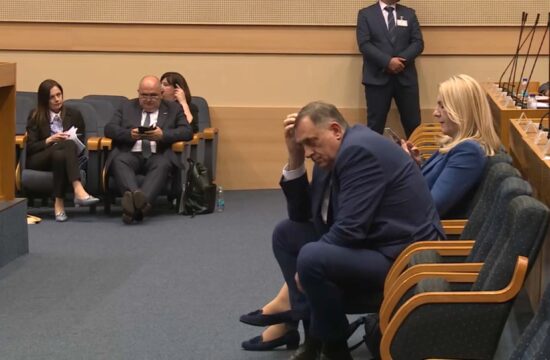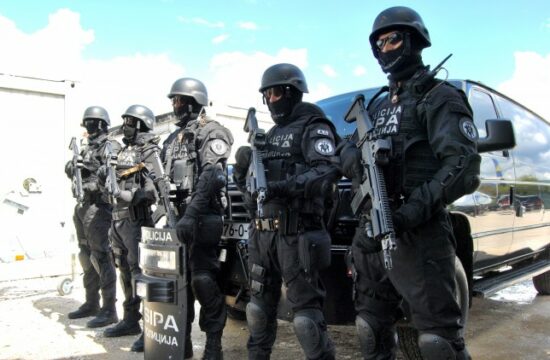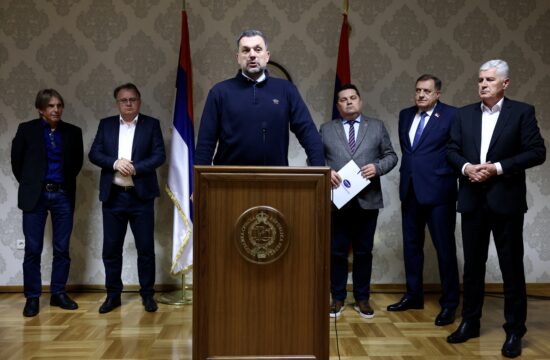Bosnia’s Justice Minister replied on Friday to a letter the chief prosecutor for the UN Mechanism for International Criminal Tribunals (UNMICT) sent to him, asking the Minister why approved the transfer a Bosnian Croat war criminal to Croatia and if he knew his sentence would be decreased there.
He also asked if Grubesa will ask Croatia to return Radic to Bosnia so that he serves the full sentence Bosnia’s court handed down against him.
But Grubesa replied that everything was done according to the law and international agreements.
During the early 1990s war, Marko Radic was the commander of the 1st Bijelo Polje Battalion of the 2nd HVO Brigade. According to the sentence, he took part in the setting up of prisons, ordered the unlawful arrest of a number of Bosniak civilians, and was responsible for using men for forced labour and keeping them in brutal, humiliating and inhumane conditions.
Bosnia sentenced him to 21 years behind bars. The verdict is based on a ruling by the International Criminal Tribunal for the former Yugoslavia (ICTY) against six top officials of the wartime unrecognised Bosnian Croat statelet of Herzeg-Bosnia (HB).
The Court said that the six have, with the help of top officials in Croatia, including the Croatian wartime President, committed war crimes with the purpose “to ethnically cleanse Bosnian Muslims and contributed to realising that goal” and that the crimes constituted a “joint criminal enterprise.”
Croatia denies this definition of events that occurred in Bosnia.
Radic has dual citizenship and asked to be transferred to Croatia, which Grubesa approved.
A Croatian court then cut Radic’s sentence by half because and does not have “joint criminal enterprise,” defined within its criminal law.
“This is a result which is difficult to understand, and it will likely be detrimental to the trust the victims and the public have into the Justice Ministry and the judiciary in Bosnia and Herzegovina,” the UNMICT Chief Prosecutor Serge Brammertz wrote in his letter to Grubesa.
It was all done according to laws and in harmony with international conventions, Grubisa replied.
War crimes processes “can in most cases not be solved without international cooperation between judicial bodies in Bosnia and Herzegovina and judiciaries of other countries, especially of regional states,” Grubesa’s letter of response said, adding that this cooperation is based on international agreements and protocols signed between state prosecutor’s offices.
“Cooperation between those states in this area is based mainly on the trust of one state in the judicial system of another,” Grubesa wrote.
He wrote that, as a Justice Minister, he is expected to further international judicial cooperation with regional countries by using Council of Europe conventions but that “at the same time we are aware of the differences in the legislation of the countries in the region and even the different views of the character of the war in Bosnia and Herzegovina.”
“It is difficult to find the right balance between the requirements and the situation on the ground,” Grubesa added.
The Justice Minister stressed that he was determined to respect the Council of Europe conventions, which include the Convention on the Transfer of Convicts and which he applied when he decided to approve Radic’s transfer to Croatia.
What happened with the convict’s sentence in Zagreb is not his responsibility, he alleged.
“As I am not authorised to influence the rulings of the courts in Bosnia and Herzegovina, I am also not able to influence the ruling of courts in other countries,” he wrote.
Grubesa also noted that Brammertz’s assessment of the effect his decision had on the public trust in the judiciary and Justice Ministry was “baseless.”
He said he believes “it is impossible to satisfy the victims of the crimes and that this cannot be what guides the (judge’s) actions in cases of war crimes.”
He pointed out that victims are also dissatisfied with the ICTY rulings against Biljana Plavsic, the former President of Bosnia’s Serb-dominated part, Republika Srpska, who was sentenced to 11 years behind bars for war crimes. She was released after serving two-thirds of her sentence with the explanation that she had shown good behaviour, the minister noted.
He also listed several other high-profile war criminals against whom the court in The Hague handed down mild sentences, acquitted them or sent them home after they served two-thirds of their sentence.
The Radic case was treated by the public as if Croatia had acquitted him when the Zagreb court only applied domestic law in his case, Grubesa argued.
Had Radic been sentenced by the ICTY and sent to serve in Sweden, as Plavsic was, he would have been released by now just like she was “and that would have been acceptable to everyone,” Grubesa fired back.
“I think we need to be careful with our statements and not cause additional distrust where there is no need to do so,” he wrote.
“I’m afraid that statements coloured with personal opinions and victim’s pain are not contributing to a better and peaceful future in Bosnia and Herzegovina,” Grubesa wrote, adding that “in the same way, one has to be careful when making statements about the work of institutions of other countries.”




